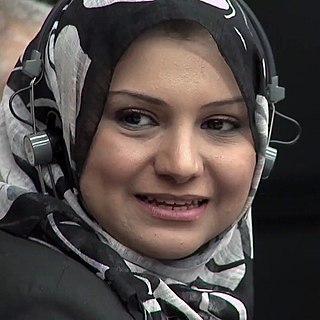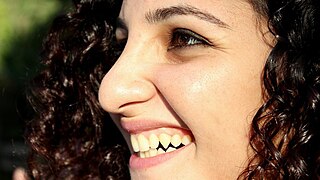Related Research Articles

Soad Hosny was an Egyptian actress born in Cairo. She was known as the "Cinderella of Egyptian cinema" and one of the most influential actresses in the Middle East and the Arab world. She rose to stardom at the end of the 1950s, performing in more than 83 films between 1959 and 1991 with nine films in the greatest 100 films in the history of Egyptian cinema. A majority of her films were shot in the 1960s and 1970s. Her final screen appearance was in the 1991 film The Shepherd and the Women directed by her ex-husband Ali Badrakhan.
Liberalism in Egypt or Egyptian liberalism is a political ideology that traces its beginnings to the 19th century.
The National Film Award for Best Supporting Actress is an honour presented annually at India's National Film Awards ceremony by the Directorate of Film Festivals (DFF), an organisation set up by the Indian Ministry of Information and Broadcasting. Since 1984, the award is given by a national panel appointed annually by the DFF to an actress for the best performance in a supporting role within Indian cinema. It is presented by the President of India at a ceremony held in New Delhi.

Khaled Muhammad Samy Abol Naga, credited as Khaled Abol Naga and by the mononym Kal Naga, is an Egyptian actor, director and producer. He is recognized primarily for his work in Egypt and the Middle East, but has increasingly ventured into American and British film and television roles. He started acting and directing plays and musicals in Egypt while studying theatre at The American University in Cairo. Beginning his professional acting career in 2000, Naga starred in several movies through the next decade with roles encompassing several genres, from musicals None but that! (2007), action Agamista (2007), Eyes Of A Thief (2014), thrillers Kashf Hesab (2007), art-house Heliopolis (2009), Villa 69 (2013), Decor (2014), and slapstick comedy Habibi Naêman (2008). Additionally, he has participated in several European film festivals, where he received a range of awards as an actor and producer. Since 2016, he has acted in several English-speaking roles, such as Tyrant on FX, History Channel's Vikings, and the BBC's TV mini-series The Last Post, and announced to appear in the upcoming Netflix Show Messiah 2019. In a film festival in 2016 that celebrated Arab film submissions to the Oscars, he was noted as being the most submitted actor in Arabic films submissions to the Academy Award for Best Foreign Language Film. He is often tagged in western media as "Egypt's Brad Pitt", and he has also been described as "the next Omar Sharif" especially after his American debut movie Civic Duty in 2007. Chosen as a Goodwill Ambassador for UNICEF in 2007, Naga played a pivotal role in child rights awareness, as well as the very first HIV awareness campaigns in Egypt and the Arab world, and participated in several international causes, including advocating for democracy in his home country Egypt. He is one of the most recognizable celebrity faces of the 2011 Egyptian Revolution, taking part in mass demonstrations in Cairo that led to the removal of President Mubarak. He faced defamation campaigns against him by the state-owned media during the Mubarak era before the January 25th, 2011 revolution in Egypt, and several times again from the 2013 "coup d'etat" General Sisi government in Egypt in retaliation for his advocacy about the deterioration of human rights situation in Egypt.

The 2011 Egyptian revolution, also known as the 25 January revolution, began on 25 January 2011 and spread across Egypt. The date was set by various youth groups to coincide with the annual Egyptian "Police holiday" as a statement against increasing police brutality during the last few years of Hosni Mubarak's presidency. It consisted of demonstrations, marches, occupations of plazas, non-violent civil resistance, acts of civil disobedience and strikes. Millions of protesters from a range of socio-economic and religious backgrounds demanded the overthrow of Egyptian President Hosni Mubarak. Violent clashes between security forces and protesters resulted in at least 846 people killed and over 6,000 injured. Protesters retaliated by burning over 90 police stations across the country.

Asmaa Mahfouz is an Egyptian activist and one of the founders of the April 6 Youth Movement. She has been credited by journalist Mona Eltahawy and others with helping to spark a mass uprising through her video blog posted one week before the start of the 2011 Egyptian revolution. She is a prominent member of Egypt's Coalition of the Youth of the Revolution and one of the leaders of the Egyptian revolution.

The following is a chronological summary of the major events that occurred during the Egyptian Revolution of 2011, after Hosni Mubarak's resignation. Protests and riots led to the deaths of hundreds, injuries of thousands and the arrests of tens of thousands. Millions have mobilised the streets since the revolution.

Human rights in the post-Mubarak transition have been the subject of concern and controversy since the 2011 Egyptian revolution. The Supreme Council of the Armed Forces (SCAF) Arabic: المجلس الأعلى للقوات المسلحة, al-Maǧlis al-ʾAʿlā lil-Quwwāt al-Musallaḥah in particular have been the focus of concerns about human rights violations. The SCAF, which consists of a body of 20 senior officers in the Egyptian military, was handed the power to govern Egypt after the ouster of President Hosni Mubarak on 11 February 2011 as a consequence of the revolution.

Mona Seif is an Egyptian human rights activist known for her participation in dissident movements during and after the 2011 Egyptian revolution, for her creative use of social media in campaigns, and for her work to end military trials for civilian protesters. She is a biology graduate student, investigating the BRCA1 breast cancer gene.

The following chronological summary of major events took place during the 2011 Egyptian revolution right up to Hosni Mubarak's resignation as the fourth President of Egypt on 11 February 2011.

The 2012–2013 Egyptian protests were part of the crisis in Egypt including the June 2013 protests, the July 2013 coup d'état, and part of the post-coup unrest. They saw varying opposition against three contiguous heads of state; namely, the Supreme Council of the Armed Forces (SCAF), Muslim Brotherhood, and the de facto ruling Egyptian Armed Forces.

Hend Kheera is an Egyptian street artist whose work features a mix of stencils and slogans. She is one of the leaders of Egypt's street-art boom since the 2011 uprising. Kheera has been an active participant in anti-sexual harassment campaign in Egypt in response to Mass sexual assault in Egypt

Ship of Theseus is a 2012 Indian drama film written and directed by Anand Gandhi, and produced by actor Sohum Shah. The film explores "questions of identity, justice, beauty, meaning and death through the stories of an experimental photographer, an ailing monk and an enterprising stockbroker", played by Aida El-Kashef, Neeraj Kabi and Sohum Shah.

The 30 June protests occurred in Egypt on 30 June 2013, marking the one-year anniversary of Mohamed Morsi's inauguration as president. The events ended with the 2013 Egyptian Revolution after mass protests across Egypt demanding the immediate resignation of the president. The rallies were partly a response to Tamarod, an ostensibly grassroots movement that launched a petition in April 2013, calling for Morsi and his government to step down. Tamarod claimed to have collected more than 22 million signatures for their petition by June 30, although this figure was not verified by independent sources. A counter-campaign in support of Morsi's presidency, named Tagarod, claimed to have collected a mere 2 million signatures by the same date, but this figure was also unverified and not mentioned in media nearly as much as Tamarod's, with no reliable sources repeating it. The movements in opposition to Morsi culminated in the June 30 protests that occurred across the country. According to the Egyptian military, which calculated the number of protesters via helicopter scans of demonstration perimeters across the country, the June 30 protests had 32 million protesters, making them "the biggest protests in Egypt's history."

Protests against the 2013 Egyptian coup d'état erupted in July 2013. Immediately following the removal of President Mohamed Morsi by the Egyptian Armed Forces on 3 July 2013 amid demonstrations against Morsi's rule, many protesters amassed near the Rabia Al-Adawiya Mosque to call for Morsi's return to power and condemn the military, while others demonstrated in support of the military and interim government. Deadly clashes such as Rabaa massacre continued for several days, with three particularly bloody incidents being described by officials as "massacres" perpetrated by security forces. During the month of Ramadan, prime minister Hazem al-Beblawy threatened to disperse the ongoing Pro-Morsi sit-ins in Rabaa al-Adaweya square and al-Nahda square. The government crackdown of these protests occurred in a violent dispersal on 14 August 2013. In mid-August, the violence directed by the army towards the protesters escalated, with hundreds killed, and the government declaring a month-long nighttime curfew.
Rape in Egypt is a criminal offense with penalties ranging from 15 to 25 year and a lifetime sentence if the rape included abduction. Marital rape is legal. By 2008, the U.N. quoted Egypt's Interior Ministry's figure that 20,000 rapes take place every year, although according to the activist Engy Ghozlan (ECWR), rapes are 10 times higher than the stats given by Interior Ministry, making it 200,000 per year. Mona Eltahawy has also noted the same figure (200,000), and added that this was before the revolution.

Nelly Karim is an Egyptian actress, model, and ballerina of mixed race.

Cairokee is an Egyptian rock band that was officially launched in 2003 but came to prominence with its revolutionary music following the Egyptian Revolution of 2011 due to its politically-inspired lyrics and protest songs released following the uprising. Their title song "Ya El Midan", featuring Egyptian singer Aida el Ayoubi who had previously retired in the 1990s, ranked number one on Facebook worldwide for downloads and number eight on YouTube with more than half a million views on the video channel in just two days following its internet release.

The mass sexual assault of women in public has been documented in Egypt since 2005, when Egyptian security forces and their agents were accused of using it as a weapon against female protesters during a political demonstration in Tahrir Square, Cairo on 25 May. The behavior spread, and by 2012 sexual assault by crowds of young men was seen at protests and festivals in Egypt.

Maryam Saleh, full name Maryam Saleh Saad is an Egyptian singer and songwriter and actor.
References
- ↑ Jenkins, Mark (24 October 2013). "'The Square': Egypt In Crisis, And Its People In Focus". No. Movie Review. NPR. Archived from the original on 25 September 2015. Retrieved 23 October 2016.
- 1 2 Salem, Mostafa; Ashraf, Fady; Gulhane, Joel (26 November 2013). "NoMilTrials Protest Dispersed; Prominent Activists Detained". Daily News Egypt. Archived from the original on 23 September 2015. Retrieved 15 July 2015.
- 1 2 Devi Dundoo, Sangeetha (19 July 2013). "'It's our revolution too'". The Hindu. Archived from the original on 5 July 2014. Retrieved 22 October 2016.
- ↑ Scott, A.O. (24 October 2013). "Brave Optimism of Tahrir Square Meets Other Fierce Forces". The New York Times. Archived from the original on 25 January 2014. Retrieved 15 July 2015.
- ↑ Gohar, Anicee (19 February 2014). "Egypt — Looking for a Conscience". Inter Press Service. Archived from the original on 16 July 2015. Retrieved 15 July 2015.
- ↑ Mullender, Rosie (12 June 2013). "The Female Fightback". Cosmopolitan. Hearst Magazines UK. Archived from the original on 23 September 2015. Retrieved 15 July 2015.
- ↑ Ward, Clarissa (27 March 2013). "Egyptian Women Fight Back as Sexual Assaults Skyrocket". CBS Evening News. Archived from the original on 16 July 2015. Retrieved 15 July 2015.
- ↑ "Egyptian-Based Actress Aida El Kashef to Visit India for Ship of Theseus". Indiaglitz. 13 July 2013. Archived from the original on 13 August 2015. Retrieved 15 July 2015.
- ↑ Fathi, Yasmine (2 September 2013). "Guardians of the Betrayed Dead: Inside Cairo's Zeinhom Morgue". Ahram Online. Archived from the original on 16 July 2015. Retrieved 15 July 2015.
- ↑ "Shawky's 'Yommedine' and El-Kashef's 'Ward No 3' Win SANAD Grants". Ahram Online. 12 October 2014. Archived from the original on 16 July 2015. Retrieved 15 July 2015.
- ↑ "'Ship of Theseus' Wins Indian National Film Award". Variety. 16 April 2014. Archived from the original on 16 July 2015. Retrieved 15 July 2015.
- ↑ "Egyptian Stars Win Big at Dubai Film Fest". Albawaba English. 17 December 2012. Archived from the original on 24 July 2015. Retrieved 15 July 2015.
- ↑ "The Day I Ate the Fish". Indiegogo. Archived from the original on 23 October 2016. Retrieved 22 October 2016.
- ↑ "The Day You Catch the Fish: speaking out on domestic abuse". 50 50 Inclusive Democracy. Archived from the original on 13 October 2016. Retrieved 22 October 2016.